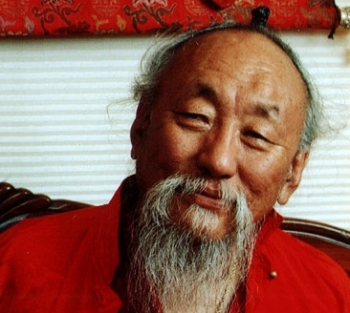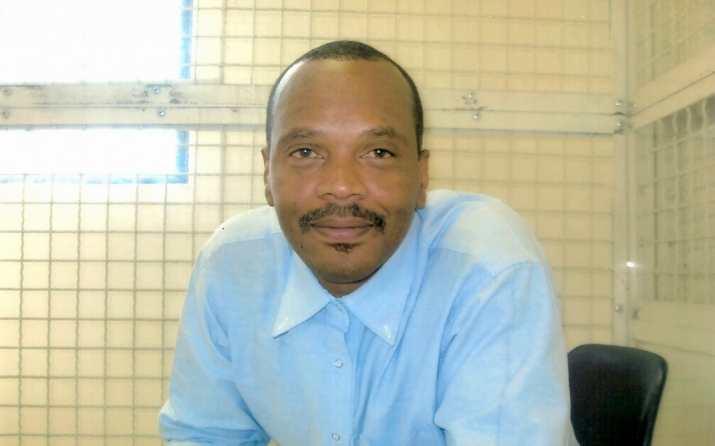The California Supreme Court on Monday affirmed a conviction of first degree murder and a death sentence against well-known Buddhist author Jarvis Jay Masters for the murder of a prison guard three decades ago, The Campaign to Free Jarvis Jay Masters, which has been committed to overturning the conviction and proving Masters’s innocence, reported on its website. Masters is still waiting for the court to hear his habeas corpus petition on other issues, including the recantation of two key witnesses and a challenge to an incriminating prison note attributed to Masters.
Masters was born in Long Beach, California in 1962, one of seven children, all of whom were taken into foster care because of their mother’s addiction to drugs. Masters reportedly witnessed a considerable amount of violence and instability before the age of five, and throughout a series of foster home placements, was in and out of trouble with the authorities. As an angry young man, he was released from the custody of the California Youth Authority (now the California Division of Juvenile Justice) and went on a crime spree—holding up stores and restaurants in the Los Angeles area until he was arrested and sent to San Quentin State Prison for armed robbery in 1981. He has been in San Quentin since the age of 19.
One night in 1985, San Quentin prison guard Sgt. Howell Burchfield was stabbed to death on the second tier of a cell block. At the time of the murder, Masters was locked in his cell in a different area of the prison. Although a number of inmates were suspected of conspiring to murder Sgt. Burchfield, only three—Jarvis among them—were tried. One was accused of actually stabbing the sergeant and another of ordering the killing, while Jarvis was accused of sharpening a piece of metal that was allegedly used to make the weapon with which the officer was stabbed.
In one of the longest trials in California history, all three defendants were convicted of murder and of conspiring to murder Sgt. Burchfield. One jury recommended the death penalty for the man accused of stabbing the guard, but the judge reduced his sentence to life without parole because of his youth and his relatively minimal criminal record. Another jury was unable to decide on a death sentence for the man accused of ordering the killing, so the prosecution decided to seek a life sentence. Both men are still in state prison. Masters, who had a long history of violence and was suspected of other killings, was sent to death row, where he has remained since 1990.
In April last year, Masters’s wife compared the anguish of having a loved one on death row to having a child diagnosed with a terminal illness. “You wait, knowing that sometime in the near future your child is going to die,” she said, declining to be named. “Time goes by, and then the doctors come back and say, ‘Maybe the child’s not going to die. We’re going to do some research and get back to you.’ Meanwhile, your child is still on their deathbed and you’re stuck in limbo. It goes on and on, year after year, and your whole life is on hold without any sense of closure for anyone involved.” (The Independent)
 Chagdud Tulku Rinpoche. From chagdudgonpa.org
Chagdud Tulku Rinpoche. From chagdudgonpa.orgThe long, hard years in prison have changed Masters, and a big part of that change has been the practice of Buddhism and meditation. During the preparations for his death penalty trial in 1990, Jarvis was introduced to the Buddhist vows by Chagdud Tulku Rinpoche (1930–2002), a teacher of the Nyingma tradition of Tibetan Buddhism. Chagdud Tulku came to the prison to conduct an empowerment ceremony and continued to visit Jarvis regularly as his root teacher until his death. Masters, who is now a student of Pema Chödrön, says his practice has been central to surviving prison: “I practice because I’m in trouble, and practice is a must for me to be a self-disciplined person. I already know what happens when I don’t practice—it ain’t too cool.” (Lion’s Roar)
Writing has also been an important outlet for Masters—as a way to communicate with the outside world and as a way to inspire others. He has written prolifically, in essays, poems, and articles. His first book, Finding Freedom, Writings From Death Row, was published in 1997. His second book, That Bird Has My Wings: The Autobiography of an Innocent Man on Death Row, which includes a foreword by Pema Chödrön, was published in 2009.
In Masters’s own words: “Those who want to make sense of my life will see, through my writing, a human being who made mistakes. Maybe my writing will at least help them see me as someone who felt, loved, and cared, someone who wanted to know himself for who he was.” (The Campaign to Free Jarvis Jay Masters)
See more
Jarvis Jay Masters’ conviction is affirmed in appeal ruling (Lion’s Roar)
Finding Freedom: The Death Row Journey of Jarvis Jay Masters (Lion’s Roar)
The Campaign to Free Jarvis Jay Masters
State Supreme Court affirms death sentence of San Quentin guard’s killer (marinij.com)
Death row: The man sentenced 20 years ago... who still doesn't know the day he will die (The Independent)
Chagdud Tulku Rinpoche (Chagdud Gompa)
















